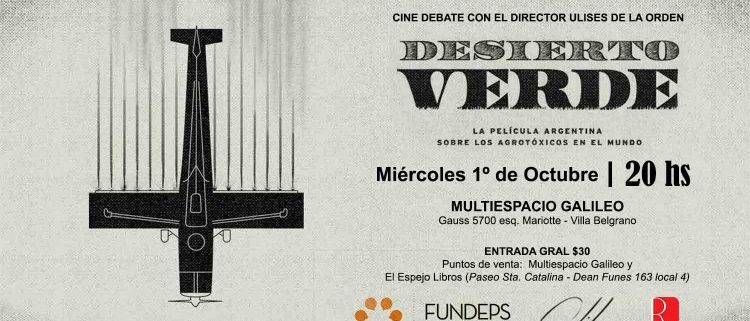FUNDEPS and Multiespacio Galileo present, ‘Green Desert,’ an Argentinian film about agro-toxins in the world
Within the framework of the film and debate series ‘Quaestiones Disputatae. Environmentalism and ecological movements,’ organized by Multiespacio Galileo, FUNDEPS presents “Green Desert” an Argentinian film about agro-toxins in the world. The event will take place on Wednesday 3rd October at 20:00, director Ulises de La Orden will also be in attendance.
Whilst chemicals have been used in farming for more than a century, we have reached aare at the point where the frenzied drive to increase efficiency and crop yields has turned use into abuse, provoking the worst: food and poison reaching our tables.
The aim of this co-production between the Universidad Tres de Febrero and Polo Sur Cine is to open a debate and to reflect upon the use of agrochemicals, our country’s agro-industrial production models and related issues, such as: exclusion, ground levelling, health effects and the environment. We invite you to enjoy the film and to participate in the debate. The idea is to place a topic that concerns us all as a society up for discussion and also seek ways of raising awareness and treatment. We have one certainty and one problem. It is everyone’s responsibility to find a solution and to look for a way to live in a world where feeding ourselves is not harmful for our health and the environment. There are ways to create wealth, produce food and export globally without poisoning ourselves.
The event will take place on Wednesday 3rd October at 20:00 in Espacio Galileo (Av. Gauss 5700 esquina Mariotte). Tickets are $30 and can be purchased at Multiespacio Galileo or at El Espejo Libros (Paseo Santa Catalina. Deán Funes 164 – Local 4)
About ‘Green Desert’
First shown in November 2013, ‘Green Desert’ tackles intensive monoculture, the global food issue and its relationship with speculation in financial markets, without losing sight of the human cost of those who suffer the consequences. From the beginning of the past decade, in the Ituzaingó Anexo de La ciudad de Córdoba district, which borders agricultural land, cases of cancer (particularly leukemia), brain tumours and deformation began to spread amongst both children and adults, as well as various cogenital disorders. Deaths continued, regardless of age. Cases increased. The neighbours, concerned and downhearted, began to make their voices heard. A group of women (who later became known as Madres de Ituzaingó) opened an investigation by their own means. They began to question the authorities. Despite going unheard, they never gave up. With time they began to achieve their first results. They knew that one thing was responsible for the many cases of illness in the district: the use of agrochemicals in the neighbouring fields. After fighting non-stop for many years, they managed to get the attention of the authorities and the press and prosecute the three peoplethose responsible for the careless use of toxic chemicals,. tTwo of which were convicted in a historic trial, in 2012, that set a legal precedent. From then on, one thing has been certain: agro-toxins kill. The events of this exemplary trial marks the starting point of a film that frames a highly complicated economic, biotechnological and political network; covering deforestation, desertification, the advance of the soybean in agriculture, the monoculture controversy and, above all, the use of agrochemicals.
More information:
TRAILER:
http://www.youtube.com/watch?v=9G0RrD0PVM0
OFFICIAL WEBSITE:
http://desiertoverdelapelicula.com/
Translated by: Jason Booker and Luke Sidaway



